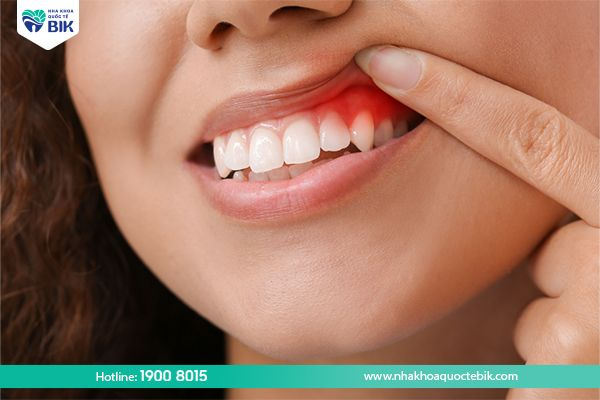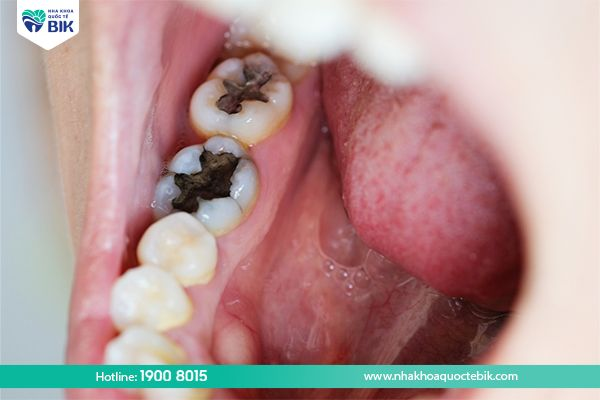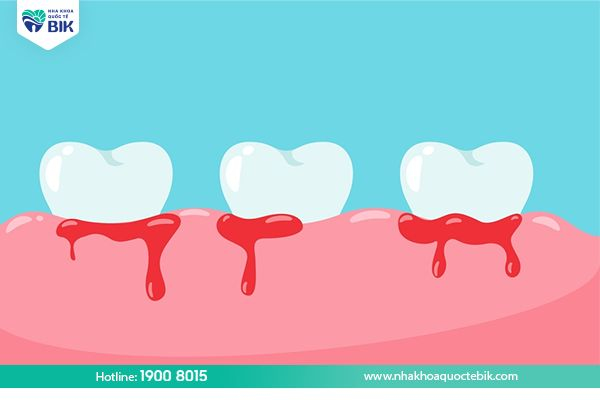
Although bleeding gums and bad breath are not a disease, they are manifestations of other oral problems. To limit this condition, you can apply the following methods to treat bleeding gums and bad breath at home with very simple ingredients, but to avoid serious complications later, you should still go to the dentist to find out the disease and treat it thoroughly.
1. What is bleeding gums and bad breath?
Bleeding gums and bad breath are not a specific disease but can be a manifestation of some of the following oral problems:
1.1. Gingivitis
This can be considered the leading disease that leads to bleeding gums and bad breath. Normally, gums are usually light pink and do not have an unpleasant odor, but when gingivitis occurs, the gums will be dark red with a feeling of pain and swelling. In addition, if this condition persists without treatment, it will lead to periodontitis and pus pockets will begin to appear, causing a fishy odor.
The main cause of gingivitis is that the patient does not practice proper oral hygiene, causing food plaque to calcify in the oral cavity over time. This plaque will accumulate into tartar and become thicker over time. If not treated, bacteria will grow and attack, damaging the gums and teeth.

1.2. Diabetes
Bad breath and bleeding gums are also symptoms of diabetes. The reason is that the patient’s body will reduce the production of insulin, which plays a role in converting blood sugar into energy. Therefore, the immune system will be significantly weakened, increasing the risk of oral diseases. In addition, the condition of difficulty in blood clotting also causes prolonged bleeding of the gums due to high blood sugar levels.
1.3. Tooth decay
Another common cause of bleeding gums with bad breath is tooth decay. When the tooth is decayed, the hard tissue of the tooth will be attacked by bacteria, forming tiny cavities and at first there will be no pain.
However, when tooth decay is not treated and progresses, the tiny spots will become more numerous, larger and begin to appear because the enamel has been damaged. The condition of prolonged pain and sensitivity will be accompanied by bleeding gums and bad breath. The bad smell comes from food left in cavities that are not cleaned thoroughly.

1.4. Leukemia
Bleeding gums and bad breath can also be a sign of leukemia. In people with this disease, white blood cells will swallow red blood cells and lead to anemia and death. In addition, bleeding gums can also occur in people with low red blood cells and platelets in the blood.
1.5. Endocrine disorders
Another case that causes bleeding gums is due to the body experiencing endocrine disorders or simply understood as the biochemical environment in the body changing erratically. This condition is easily seen in pregnant women, during the monthly menstrual cycle or in the pre-menopausal stage. At these stages, the woman’s body has erratic changes that increase the risk of bacteria entering, causing bad breath and gingivitis.
1.6. Lack of nutrients
In addition, the body not being fully supplemented with necessary vitamins and minerals will also lead to bleeding gums and bad breath due to a weak immune system. At this time, the patient needs to provide adequate nutrients for the body from foods such as fruits, green vegetables, …
In addition, do not forget to supplement enough calcium to support strong teeth, effectively preventing oral diseases.

1.7. Side effects of drugs
The use of drugs to treat other diseases such as antihistamines, antidepressants, diuretics, antibiotics, etc. can also cause bad breath and bleeding gums because the amount of saliva is reduced.
2. Is bleeding gums and bad breath dangerous?
As mentioned above, bleeding gums and bad breath can come from many different dental problems. In cases of endocrine disorders, poor oral hygiene, lack of nutrients, etc., they can be improved immediately in many different ways. In addition, if bleeding gums and bad breath are caused by other diseases, you need to go to the dentist for thorough treatment to avoid dangerous complications later.
In cases of bleeding gums and bad breath caused by leukemia or diabetes, the patient will face other dangerous complications, even death, if not treated properly. Therefore, if you have bleeding gums with bad breath and other symptoms such as unusual weight loss, blood clotting problems, you need to go to the dentist for timely examination and treatment.

3. How to treat bleeding gums and bad breath at home
To improve bleeding gums and bad breath at home, you can apply some of the following measures:
3.1. Use green tea leaves
Green tea leaves contain flavonoids, which are anti-inflammatory substances that effectively control gingivitis. There have been studies on the effects of green tea on oral health and people who regularly drink green tea have stronger gums than those who do not.
In addition, the scent of green tea also brings fresh breath thanks to its ability to kill bacteria that cause bad breath. You just need to take a few green tea leaves, wash them and boil them with water. After the water boils, filter out the residue and use the water to rinse your mouth after brushing your teeth.

3.2. Use turmeric powder
The main active ingredient in turmeric powder is curcumin, which has strong antibacterial properties, so it can inhibit the growth of some organisms and bacteria that cause unpleasant odors in the oral cavity. In addition, this active ingredient also has strong anti-inflammatory properties, effectively controlling gingivitis.
You just need to take 1/3 teaspoon of turmeric powder with a sufficient amount of warm water, use the above mixture to rinse your mouth after each meal.

3.3. Use clove essential oil
This is an essential oil that has antibacterial, anti-inflammatory and deodorizing effects to help reduce bad breath as well as bleeding gums effectively. You just need to use pure clove essential oil to apply on the bleeding gums and then rinse your mouth with clean water. Do 2 times/ 1 day, 5-10 minutes each time.

4. Prevent bleeding gums and bad breath
To prevent bleeding gums with bad breath, you should note the following:
– You should have the habit of brushing your teeth at least twice a day, especially after eating, to remove plaque on the tooth surface.
– You should use a soft-bristled toothbrush with moderate brushing force to avoid damaging your gums.
– Remember to change your toothbrush every 3-4 months to prevent bacteria from growing.
– Combine the use of dental floss to remove food debris in between teeth.
– Maintain a scientific diet, supplement with necessary vitamins and minerals to support increased resistance to help the body eliminate bacteria that cause bad breath.
– Visit the dentist regularly at least twice a year to ensure that oral health is checked regularly.
So you can completely apply some ways to treat bleeding gums and bad breath at home to quickly reduce this condition. However, you should also go to the dentist to find out the cause of this symptom and from there take radical treatment measures.


















